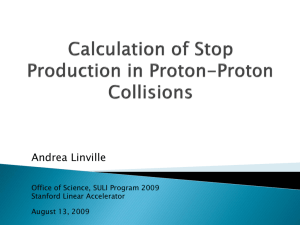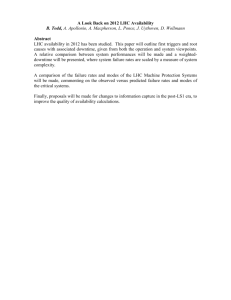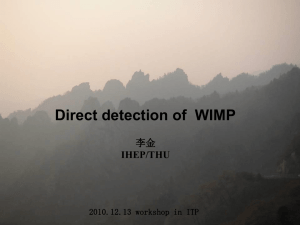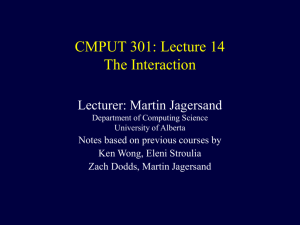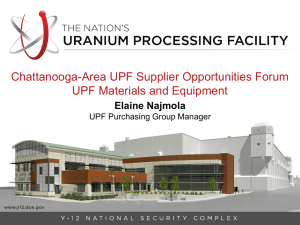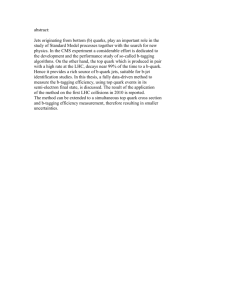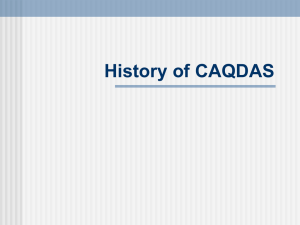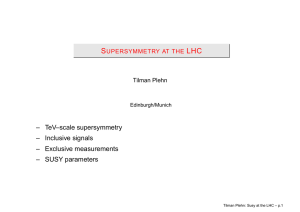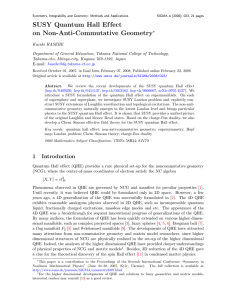Cosmology/DM - II Konstantin Matchev
advertisement
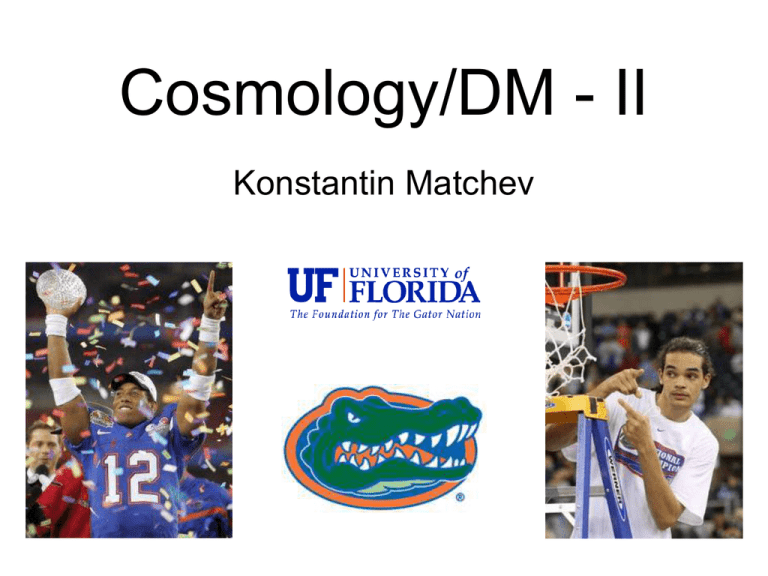
Cosmology/DM - II
Konstantin Matchev
Outline of the lectures
• All lecture materials are on the web:
http://www.phys.ufl.edu/~matchev/PiTP2007
• Yesterday: became familiar with MicrOMEGAs. Forgot to
mention:
– Bug in linking of libraries in case of new models
– MicrOMEGAs can compute indirect detection yields
– HW from Simulation Practicum at PiTP 2005 still applicable
• Earlier today: discussed several new physics models and
their respective dark matter candidates
– concentrate on WIMPs in SUSY and UED
• Now: discuss how collider and astro experiments can
– discriminate between alternative models
– determine DM properties
• Homework exercises throughout today’s lectures
Large Hadron Collider
Jura
CMS
Ebunch = 44 kJ
ECM = 14 TeV
ATLAS
CERN
How do we know LHC will find
anything new or interesting?
• The X7 argument
• Where is the Higgs?
Avenues for WIMP detection
SM
χχ
χ
SM
χSM
• Potentially observable
signals at colliders.
• Potentially observable
signals of direct DM
detection.
SM
χχ
SM
SM
SM
SM
χ
• Potentially observable
signals of indirect DM
detection.
χ
SM
χ
SM
Dark Matter at colliders:
model-independent approach
SM
χ
SM
χ
• Relate the WIMP annihilation rate in the early Universe to
the WIMP production rate at colliders. Detailed balancing:
• Predict the WIMP pair production rate
• Known parameters { σ tot , S X , s }
• Unknown parameters { κ i , M χ , S χ , J 0 }
• Not an observable signature! What if
Birkedal,KM,Perelstein 2005
?
Detector Schematics
Note the absence of a “Missing energy calorimeter”
DM production at colliders
• In order to observe the missing energy, the DM particles
must recoil against something visible
• If some sort of ISR (initial state radiation),
model-independent prediction still possible,
using soft/collinear factorization
– Very challenging experimental signature,
does not seem to work Birkedal,KM,Perelstein 2005
• Give up model-independence, look for production of the
other, heavier states in the model
– At LHC: typically the colored superpartners/KK partners
– Problems:
•
•
•
•
Proliferation of relevant model parameters
Complicated event topologies
Combinatorics confusion
Missing energy is challenging
SUSY Signature: MET + Jets + …
• Squark gluino
production
• Full Geant4
Detector
Simulation
•
•
6 hard jets
leptons
•
2 LSPs + 4 ν’s
MET Cleaning from Tevatron
• MET is very powerful
SUSY discriminator
• Difficult part is to convince
yourself that there is a real
excess!
Run II
V. Shary CALOR04
• Tevatron teaches us
• MET is not easily
understood!
• Non-collisional
backgrounds
• Beam halo
• Cosmic muons
• Detector Effects
• Instrumental Noise
• Hot/dead channels (DQM)
e/γ
junk
Run II
jets
D. Tsybychev, Fermilab-thesis-2004-58
Jet/MET Reconstruction Performance
•
Jets
•
•
QCD
Low luminosity Pileup included
ET Resolution
MET
• Stochastic term ≈ 125% / √ET
• Constant term ≈ 3%
•
CMS
Angular Resolution
• High ET Jets: better than calo cell size
(∆φ x ∆η = 0.087 x 0.087)
CMS
•
Missing Transverse Energy
•
•
Low luminosity Pileup included
<MET> from QCD
• Stochastic term ≈ 123% / √ΣET
∀ ≈1700 GeV ΣET ≈700 GeV PT dijets
≈50 GeV observed MET
Jets
•
MET φ Resolution
• Low MET : approaches Jet size
• High MET : approaches calo cell size
Testing dark matter at colliders
• OK, so we see a missing energy signal at the LHC. What
next? Is it due to dark matter?
• Look for confirmation from dark matter direct detection
experiments. Colliders and astroparticle experiments test
very different timescales. If signal seen in both, compare
– Mass
– Interaction strength
• Is it a thermal relic? Test the WIMP hypothesis:
– Assume a model framework (discriminate look-alikes)
– Measure the model parameters
– Constrain the annihilation cross-section in the early Universe.
mass
Supersymmetry or Extra Dimensions?
•Spins
differ by 1/2
•Higher levels
no
same as SM
yes
same as SM
no
SUSY or UED? Part I
• Look for level 2 KK modes of UED
Datta,Kong,KM 2005
Datta,Kong,KM 2005
SUSY or UED? Part II
• Can we measure the spins? Very difficult
SUSY
q
qQ1
UED
χ~Z201
~
l1
l ± (near )
l (far )
χ~γ 110
• Recently, several proposed methods to measure spins
and thus discriminate SUSY from UED
– Make assumptions what you know and can do
– Propose a measurement
– Interpret
Measuring spins at a lepton collider
• Find ~16 bln dollars,
build a 3 TeV CLIC
• Study the processes
shown in UED or SUSY
• Compare the angular
distributions of the muons
in the Lab
• Find out if UED or SUSY
Battaglia,Datta,DeRoeck,Kong,KM 2005
Barr Asymmetry
•Find the right jet among the
8-10 jets in the event (all of
them look very similar)
•Assume you know the
masses of all new particles
•Plot the asymmetry A+-
A
−
=
σ l −σ l −
σ l σ l −
•Find out if UED or SUSY
Barr 2004
PRECISION SUSY @ LHC
•
•
•
•
Next, measure the model parameters
Only mass differences directly
measurable @ LHC: need to
overconstrain the system
Couplings are even more difficult
The “inverse problem” is tough!
Weiglein et al. (2004)
HW
Contributions to Neutralino
WIMP Annihilation
Jungman, Kamionkowski, Griest (1995)
What do we know?
• Winning entry in the 2003 annual “Foot in mouth” award by
the Plain English Campaign:
• “As we know, there are known knowns; there are things we
know we know.”
• “We also know there are known unknowns; that is to say
we know there are some things we do not know.”
• “But there are also unknown unknowns - the ones we don't
know we don't know.”
Testing the WIMP Hypothesis
Birkedal,KM 2004
• SUSY parameters
– Relevant for DM
– Irrelevant for DM
• … but also
– Measured*
– Unknown
• Consider all possible
allowed variations of
the “unknowns”
How well can one do?
• LHC/ILC determination
of relic densities has
now been studied by
many groups.
Allanach, Belanger, Boudjema, Pukhov (2004)
Moroi, Shimizu, Yotsuyanagi (2005)
Baltz, Battaglia, Peskin, Wizansky (2006)
• Bottom line: LHC
results are not always
good, but ILC removes
degeneracies
Baltz, Battaglia, Peskin, Wizansky (2006)
IDENTIFYING DARK MATTER
Are Ωhep and Ωcosmo identical?
Yes
Calculate the
new
Ωhep
No
Yes
Which is bigger?
Congratulations!
You’ve
discovered the
identity of dark
matter and
extended our
understanding of
the Universe to T
= 10 GeV, t = 1
ns (Cf. BBN at T
= 1 MeV, t = 1 s)
Did you
make a
mistake?
No
Ωcosmo
Ωhep
No
Can you discover
another particle
that contributes to
DM?
Yes
No
Yes
Yes
No
Yes
Think about the
cosmological
constant problem
Yes
Does it
decay?
No
Are you
sure?
Yes
No
Can you identify a
source of entropy
production?
No
Does it account
for the rest of
DM?
Can this be resolved with some
wacky cosmology?
Courtesy of J.Feng, inspired by my T-shirt, IAS Princeton 2005
Discrepancies are interesting!
hep cos mo
hep cos mo
•
SuperWIMPS
– gravitino, KK graviton
• SuperWIMPS inherit the WIMP
miracle, but relic abundance is
reduced by M SuperWIMP
M WIMP
Feng,Rajaraman,Takayama 2003
SM
NLSP
G̃
•
•
Several DM species?
Kination domination Salati 2002
ρΦ
η Φ ≡ T =1 MeV
ργ
Chung,Everett,Kong,KM 2007
Avenues for WIMP detection
SM
χχ
χ
SM
χSM
• Potentially observable
signals at colliders.
• Potentially observable
signals of direct DM
detection.
SM
χχ
SM
SM
SM
SM
χ
• Potentially observable
signals of indirect DM
detection.
Direct Detection
• Expected signal rates all over
the place
• (Coherent) spin-independent
scattering most promising for
most WIMP candidates
• Theorists: χq scattering
Experimentalists:
χ nucleus scattering
Compromise: χp scattering
• MicrOMEGAs does not
compute this, but DarkSUSY
can.
Indirect Detection
Dark Matter Madlibs!
Dark matter annihilates in ________________ to
a place
__________ , which are detected by _____________ .
particles
an experiment
Dark Matter annihilates in
the galactic center
to
a place
photons
, which are detected by GLAST, HESS, … .
some particles
an experiment
HESS
COLLIDERS ELIMINATE PARTICLE PHYSICS UNCERTAINTIES,
ALLOW ONE TO PROBE ASTROPHYSICAL DISTRIBUTIONS
Very sensitive to halo profiles near the
galactic center
Particle
Physics
AstroPhysics
Dark Matter annihilates in
the halo
to
a place
positrons , which are detected by AMS on the ISS
some particles
an experiment
.
Cheng,Feng,KM 2002
Dark Matter annihilates in
the center of the Sun
to
a place
neutrinos , which are detected by AMANDA, IceCube .
some particles
an experiment
Feng,KM,Wilczek 2000
AMANDA in the Antarctic Ice
ν µ (km -2 yr -1)
Final project
• Implement your (advisor’s) favorite dark matter
model as CalcHEP model files
• Use MicrOMEGAs to calculate the relic density
• Use MicrOMEGAs to estimate the indirect
detection rates
• Use CalcHEP to estimate the size of the
collider signals at LHC/ILC
